People instinctively sense that they are ‘unclean’. We know this because, while there are many differences amongst religions and traditions in the world, they all consistently invoke the need for washing with water when approaching the Divine.
Muslims practice wudu, or ritual washing, before prayer. Hinduism practices include bathing in sacred rivers, like the Ganges – to purify oneself before sacred festivals. Buddhist monks wash themselves in water before meditating. Shinto undergo Harae, or ritual washing, before worship. Jews practice Tevilah (full body immersion in a mikveh or bath), especially before their sacred festivals. In Christendom, baptism fulfills a similar role.
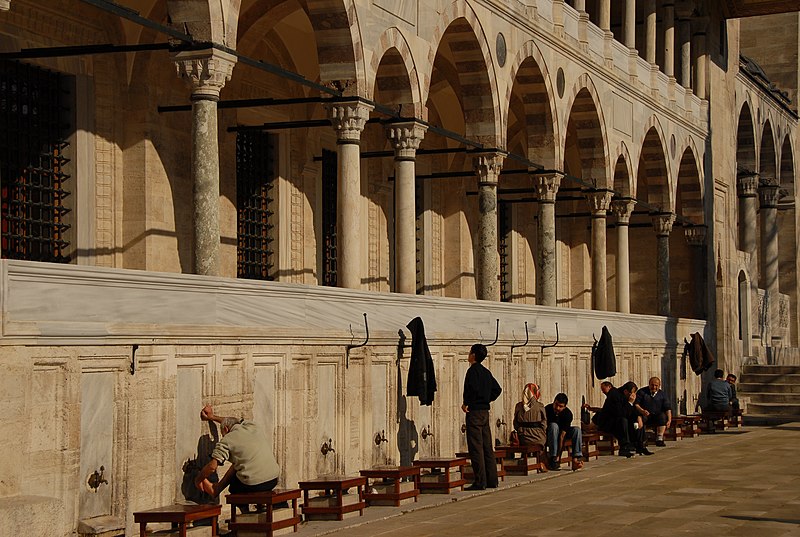
np&djjewell, CC BY 2.0, via Wikimedia Commons
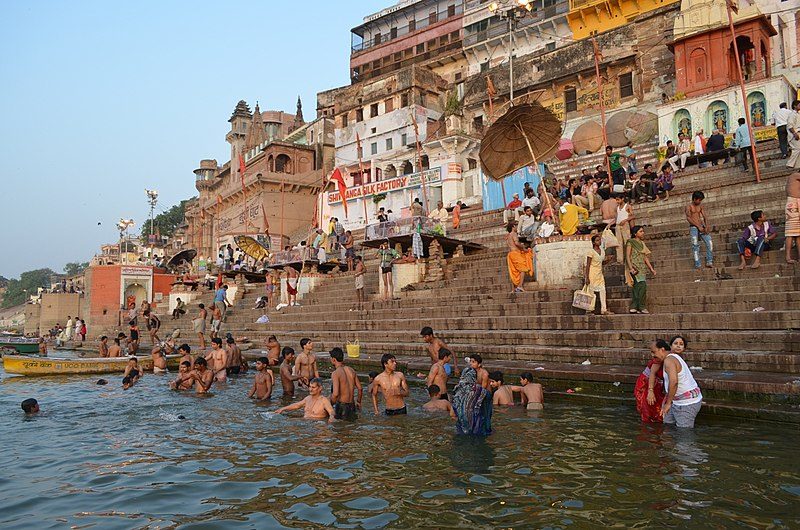
Matt Stabile, CC BY 2.0, via Wikimedia Commons

Tevaprapas, CC BY-SA 2.5, via Wikimedia Commons
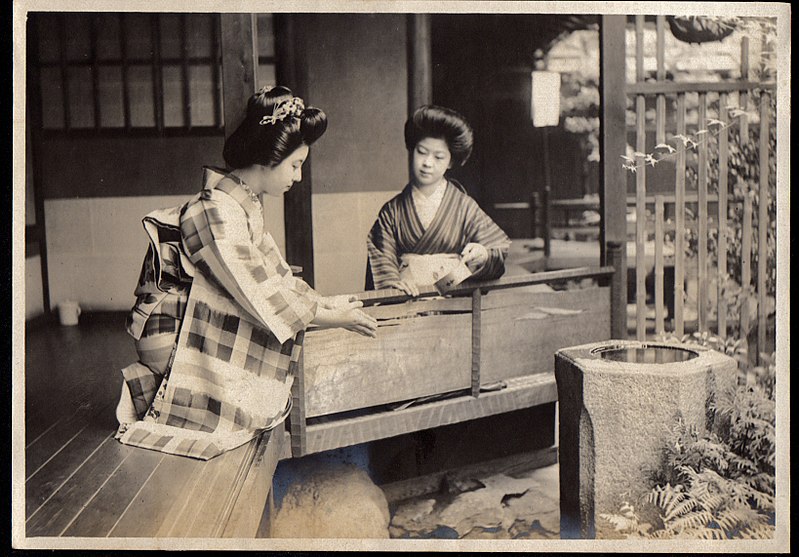
A.Davey from Portland, Oregon, EE UU, CC BY 2.0, via Wikimedia Commons
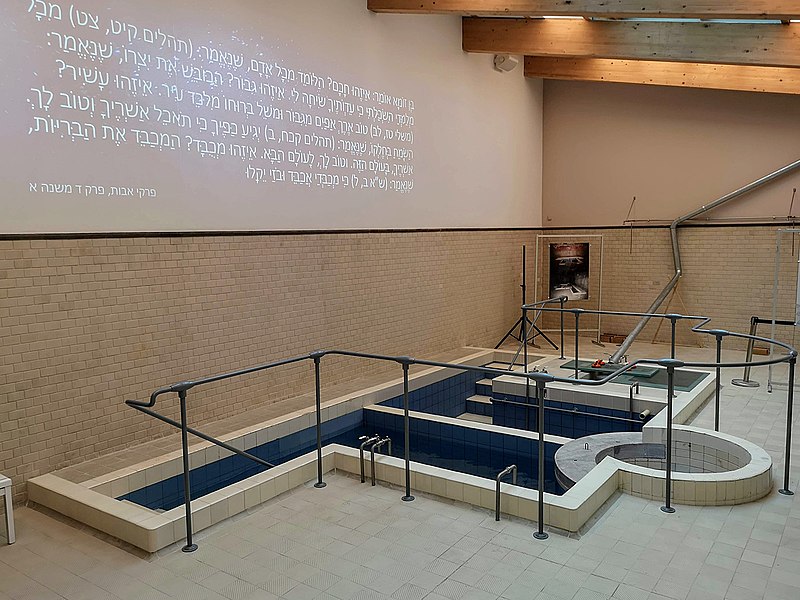
Stefan Walkowski, CC BY-SA 4.0, via Wikimedia Commons
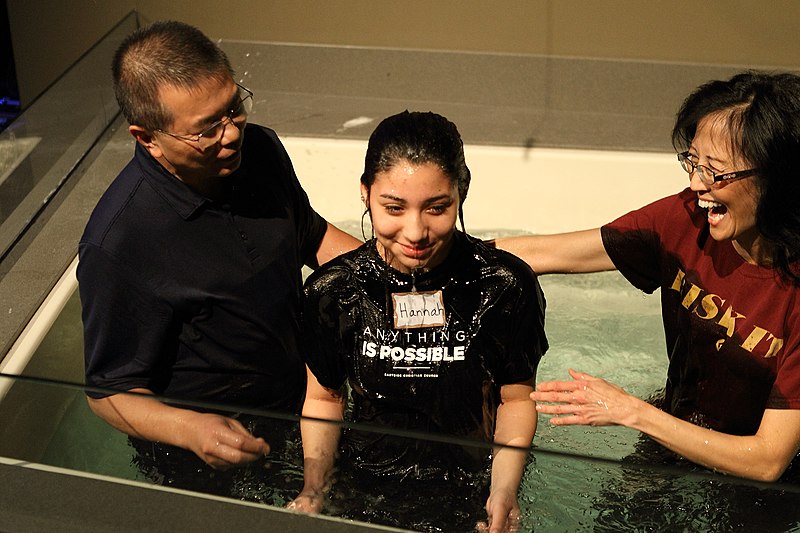
Eastside Christian Church from Anaheim, CA, CC BY 2.0, via Wikimedia Commons
The various churches practice baptism a little differently, but Yeshau’s baptism by John the Baptist sets the example.
Baptism of Moses (Moshe)
Although this receives most attention, baptism in the Tanakh (Bible) goes back long before the time of Yeshua. The rabbi and apostle Paul writes:
“For I do not want you to be ignorant of the fact, brothers and sisters, that our ancestors were all under the cloud and that they all passed through the sea. 2 They were all baptized into Moses in the cloud and in the sea.”
1 Corinthians 10:1-2
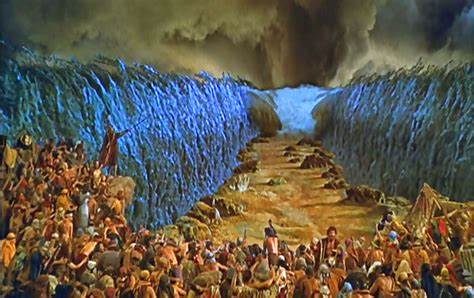
Paul refers to the Israelite Exodus out of Egypt, just after Pesach (Passover), as the moment when the Red Sea parted and the Israelites walked through it. As recorded in Exodus 14, the Egyptians tried to follow, but perished when walls of water came crashing down on them in their pursuit of the Israelites through the parted sea. The Israelites, led by Moses (Moshe), were all ‘baptized into Moses’ when they walked through the Red Sea. It became their national baptism.
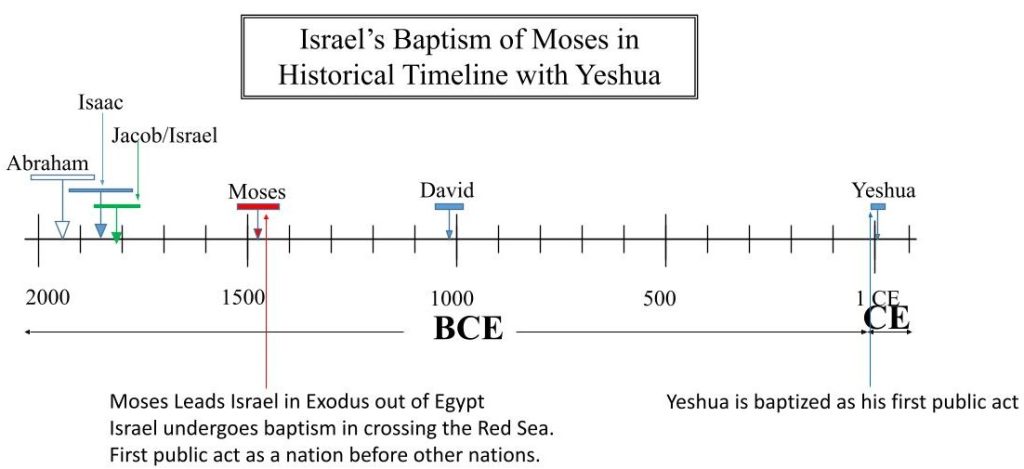
Yeshua’s Baptism Extends the Pattern
We are exploring the Gospel’s portrayal of Yeshua as the fulfillment, or embodiment, of Israel. His miraculous birth paralleled that of Yitzhak (Isaac), as well as his flight from Herod that paralleled of Jacob (Yaaqob)/Israel. Yeshua’s baptism continues the pattern. Why did Yeshua undergo baptism? He did not need cleansing. John the Baptist said as much when Yeshua approached him for baptism, as Matthew’s Gospel records:
13 Then Jesus came from Galilee to the Jordan to be baptized by John. 14 But John tried to deter him, saying, “I need to be baptized by you, and do you come to me?”
15 Jesus replied, “Let it be so now; it is proper for us to do this to fulfill all righteousness.” Then John consented.
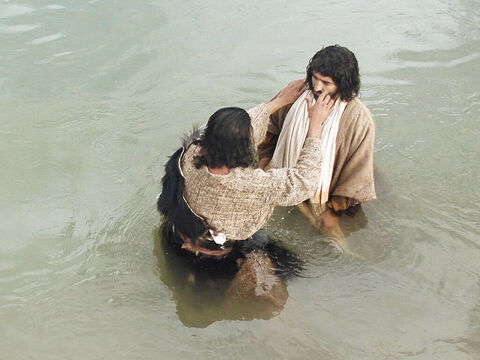
16 As soon as Jesus was baptized, he went up out of the water. At that moment heaven was opened, and he saw the Spirit of God descending like a dove and alighting on him. 17 And a voice from heaven said, “This is my Son, whom I love; with him I am well pleased.”
Matthew 3:13-16
Yeshua did not need baptism for cleansing from impurity. He was already clean on the inside so nothing physical could make him unclean. But his baptism was another indicator of his pattern with Israel. As Israel went through a baptism, so he also went through a baptism.
Baptism of … cups
What does ‘baptism’ mean in the Gospels? We can answer this by noting how the Gospels use this word. As a comment on Jewish ritual washing, Mark notes that:
The Pharisees and all the Jews do not eat unless they give their hands a ceremonial washing, holding to the tradition of the elders. 4 When they come from the marketplace they do not eat unless they wash. And they observe many other traditions, such as the washing of cups, pitchers and kettles.
Mark 7:3-4
Three times the word ‘wash’ appears. In the original Greek, the first wash (in v3) is nipsōntai, the standard word for wash. But the two other ‘wash’s in verse 4 are baptismous – baptism! So the Jews ‘baptized’ themselves and their cups when they washed them! Baptism simply meant to cleanse by immersion in water.
Baptism in water not the issue
Though many view baptism with water in Christendom as being able to cleanse us the Brit Chadasha explains the active source of our cleansing.
18 For Christ also suffered once for sins, the righteous for the unrighteous, to bring you to God. He was put to death in the body but made alive in the Spirit. 19 After being made alive, he went and made proclamation to the imprisoned spirits— 20 to those who were disobedient long ago when God waited patiently in the days of Noah while the ark was being built. In it only a few people, eight in all, were saved through water, 21 and this water symbolizes baptism that now saves you also—not the removal of dirt from the body but the pledge of a clear conscience toward God. It saves you by the resurrection of Jesus Christ, 22 who has gone into heaven and is at God’s right hand—with angels, authorities and powers in submission to him.
1 Peter 3:18-22
Here it clarifies that the ‘removal of dirt from the body’, that is a ritual physical washing of some sort, is not the baptism that saves. Rather it is the ‘pledge of a clear conscience toward G-d’ – the inner repentance that John the Baptist taught – that saves. It saves us as verse 18 explains because it is Yeshua himself who is righteous (spiritually clean) so that he brings us to G-d through his death and resurrection, explored more fully here.
Baptism into Yeshua
In fact, we need baptism, not in water, but into Yeshua himself, as the Tanakh (Bible) explains
Or don’t you know that all of us who were baptized into Christ Jesus were baptized into his death? 4 We were therefore buried with him through baptism into death in order that, just as Christ was raised from the dead through the glory of the Father, we too may live a new life.
Romans 6: 3-4
In trusting Yeshua he washes us and thus we can ‘live a new life’.
That ‘new life’ involves an ability to have victory over temptation and sin. Yeshua shows exactly how he does this in what he went through immediately after his baptism. He went into the desert for 40 days for testing by the devil, once again patterning as Israel which had undergone testings for 40 years in the desert immediately after their baptism from Moshe (Moses).